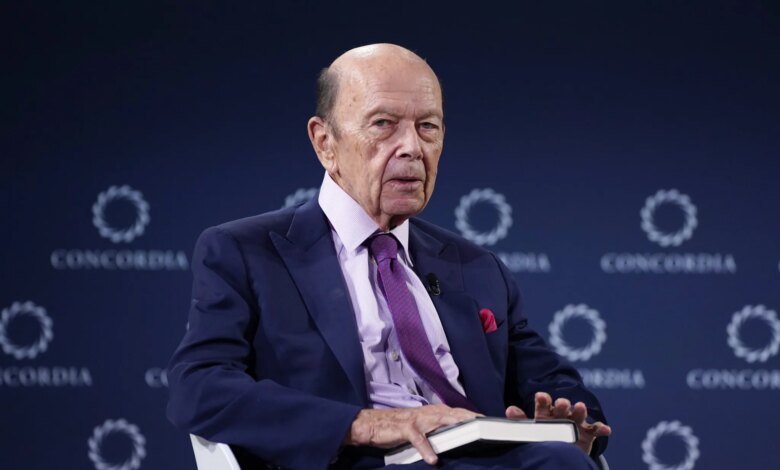Trump’s former trade architect says the president can’t backtrack on tariffs because he’s ‘too committed’ now: ‘That would be a pretty horrific decision’

As the Supreme Court prepares to hear one of the most important economic cases in decades — the legality of President Donald Trump’s sweeping new tariffs — one of the original architects of his trade agenda says the president has gone too far to back down.
said Wilbur Ross, who, as the president’s Commerce Secretary from 2017 to 2021, helped design Trump’s first wave of steel and aluminum tariffs during his first term. luck Complete defeat by the Supreme Court is unlikely. But even if that happens, Trump will not go away.
“He is too committed to the tariffs to abandon them,” Ross said. “If they lose, I don’t think he’ll say, ‘Well, well, it didn’t work under this law, I’ll give it up.’ “He’s very invested.”
A weaker case – and a bigger gamble
The Supreme Court on Wednesday is scheduled to hear arguments on whether Trump exceeded his authority by using emergency powers to impose tariffs on more than 100 countries and nearly every U.S. trading partner. Technically, according to Article 1, Section 8 of the Constitution, congress, not the President, has the right to impose and collect “taxes, duties, excises, and excises.” Tariffs, as a duty, fall into the category of needing congressional approval. However, to get around this, the Trump administration invoked the International Emergency Economic Powers Act (IEEPA) of 1977, which allows the president during “national emergencies” to take regulatory action, to impose tariffs, even though the law does not mention duties.
This isn’t the first time Trump has found a legal solution to act unilaterally on trade: In 2018, Ross helped Trump craft a waiver under Section 232 of the Trade Expansion Act to trigger the first round of tariffs on China and other countries. After that, Ross said his team held public hearings, consulted with industries and commercial partners, and built a lengthy administrative record in anticipation of court challenges.
“We were supported the whole time,” he recalls. “This gave a better definition of what the government could do.”
But this time, Ross noted, the administration “didn’t do much” of the same administrative process, meaning Trump’s team enters the court on weaker ground than before.
“They were in a hurry to get things going,” he added. “This requires a little more risk.”
The risks are high. Trump used the emergency rule to impose tariffs on goods in every hemisphere, upending markets for months and generating nearly $195 billion in revenue for the government according to the Committee for a Responsible Federal Budget (CRFB). The Supreme Court lawsuits — brought by importers and small manufacturers — allege that the president’s sweeping use of emergency powers violates Congress’ authority to tax and regulate trade.
Trump’s lawyers say the IEEPA’s broad language, which allows presidents to “regulate” commerce during “unusual and extraordinary threats,” gives him broad discretion to act. Its critics counter that the trade deficit is an “emergency” that stretches the meaning of the law beyond recognition.
Ross sees the case as a reprieve, but expects the court will not strike down the entire program. He warned that imposing all tariffs would create global unrest.
“This would be a very horrific decision,” he said, adding that it would pose difficult questions about who exactly would be reimbursed: importers, consumers, or companies that passed the costs down the supply chain.
He said he believes the justices are likely to “cherry-pick” some definitions that appear politically motivated, while leaving the rest of the system intact. As an example of a tariff he believes is likely to be eliminated, he pointed to a 40% duty on Brazilian imports — on top of a 10% tax earlier in the year — that Trump imposed over the impeachment of former President Jair Bolsonaro.
“No matter how bad Bolsonaro’s trial is, it is difficult to imagine that this constitutes an emergency for the United States,” Ross said.
The former commerce secretary also said he believed tariffs on menial individual goods such as “brooms” or household items were unlikely to meet the standards set by the IEEPA. However, he said other cases constitute a national emergency, such as Trump imposing tariffs on Mexico, China and Canada to stem the flow of fentanyl into the United States.
Markets fear uncertainty more than they fear defeat
Even if the court narrows Trump’s power, Ross said the president is unlikely to abandon tariffs completely.
“He’s very committed,” he said again.
Alternatively, Trump could seek a new legal basis for his actions or push Congress to legalize the measures. He noted that union support for protectionist policies has blurred traditional party lines, although in the current political climate, Democrats may be more inclined to oppose Trump than defend their traditional pro-labor stance.
Ross, known in business circles as the “bankruptcy king” for restructuring distressed industries before joining the administration, sees the current battle as a familiar game between risk and reward. The risk, he said, is not only of losing the case, but also of creating uncertainty for companies that rely on predictable trading rules.
“Markets can adjust to good news or bad news,” he said. “The problem with markets is uncertainty.”
Don’t miss more hot News like this! Click here to discover the latest in Business news!
2025-11-04 21:00:00




